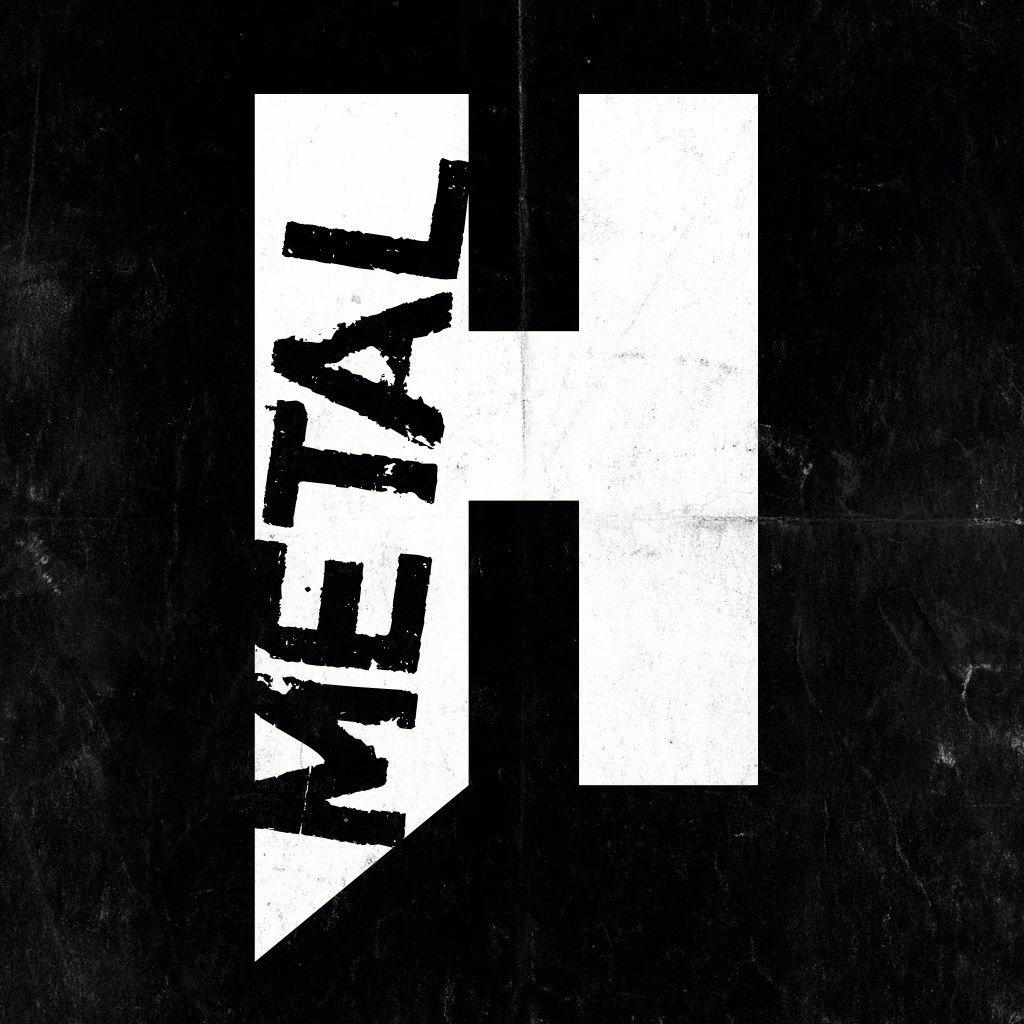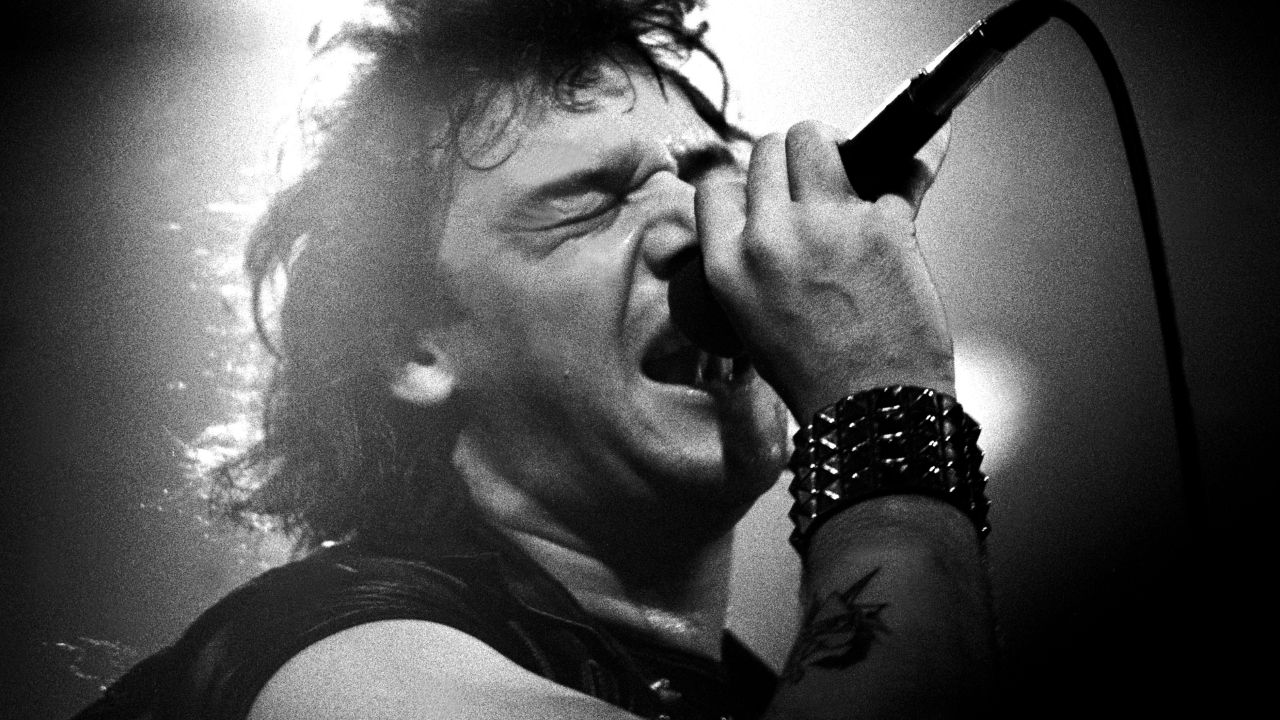The bands you love celebrate 30 years of Metal Hammer
Babymetal, Megadeth, Nightwish – we gathered a tribe of the bands you guys love to look back over the history of Hammer, of metal and to share their favourite memories of the last 30 years
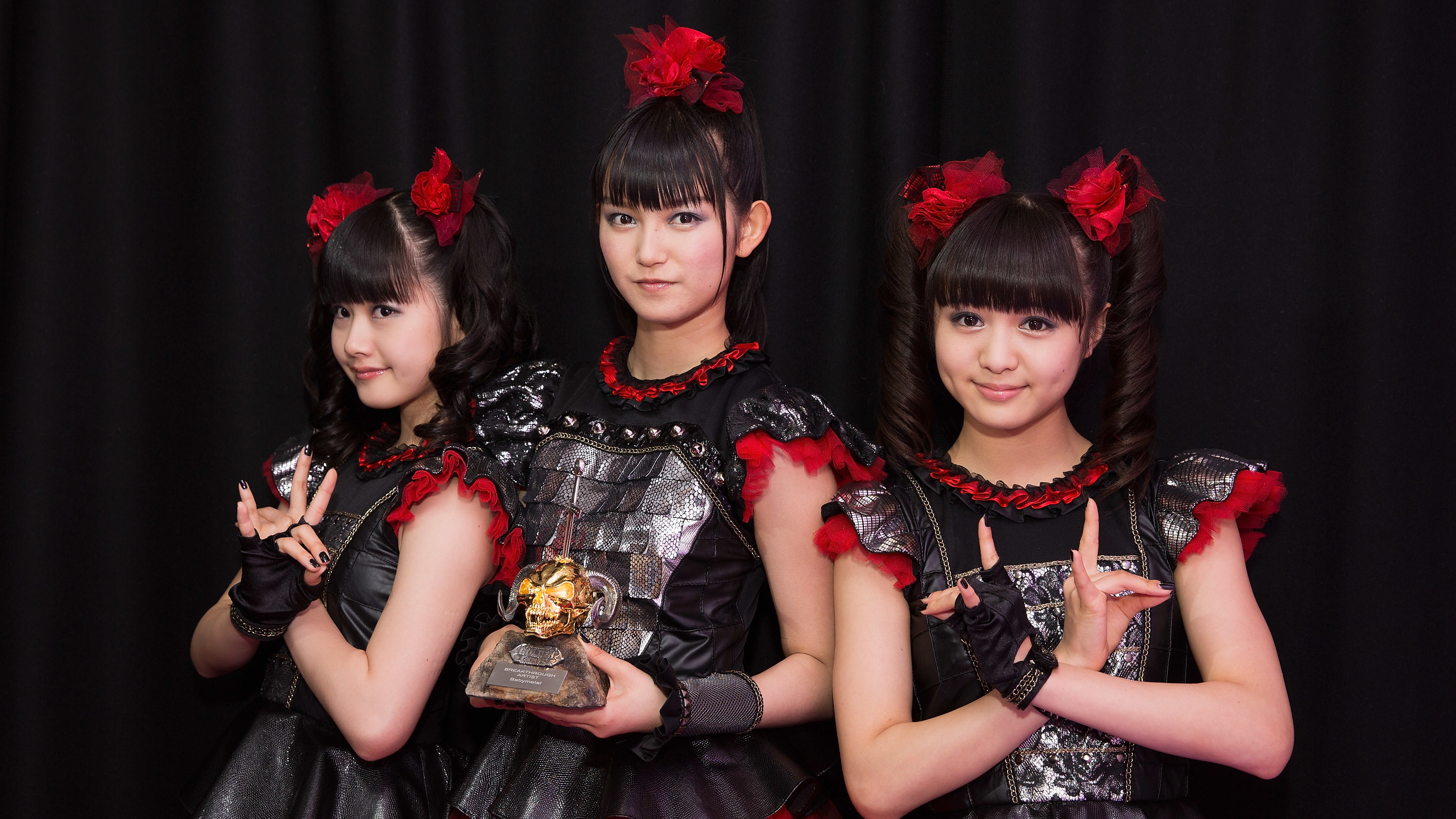
Babymetal
The trio crashlanded into our world, took on Wembley Arena, and count metal’s icons among their biggest fans
When you first came out, some people criticised you for not being a ‘real’ metal band. How did that make you feel?
Su-Metal (Vocals): “We didn’t know anything about metal when we started out, so when we heard feedback from those who enjoy Babymetal and those who don’t, we thought, ‘Then what is metal?’ It became our motivation to learn about metal; we’re grateful for that.”
Do you feel that the metal world has embraced you now?
“Some people still can’t accept us, but our fans tell us there’s no mistake in our music and that it’s interesting. So we have more confidence in our music than ever.”
Were you surprised by how quickly you became popular, playing Sonisphere in 2014 and Wembley Arena this year?
“To be honest, everything just went by so fast, I still can’t believe it all happened in just two years.”
Sign up below to get the latest from Metal Hammer, plus exclusive special offers, direct to your inbox!
What was it like playing Wembley?
“It was a huge venue, but as we performed song by song, I felt that we all became one together. I was so moved when the audience sang The One. It really felt like we were being supported by everyone present at the venue.”
What’s your ultimate aim with Babymetal?
“We haven’t decided our final goal yet, but I feel that it will just be us meeting the challenges on the path in which we believe.”
Do you think Babymetal will reach its 30th birthday, which will be in 2040?
“You should know the answer to this by now. Only The Fox God knows!”
Lamb Of God
The groove metallers who would rise again and again
The band really took off with 2006’s Sacrament. What was that time like?
Mark Morton (guitar): “It was a really interesting, vibrant time for this band. We were really reaching our stride. I felt we had a lot to prove and were capable of hanging with the big names of the time and operating at the Main Stage festival level. I had a lot of aggressive, competitive energy and wanted to wipe the floor with everyone we played with. Wherever we played, we went in with this competitive spirit where we wanted to blow bands like Slayer off the stage. I’d argue that there were a few times that we did! I think we proved ourselves, gaining respect amongst our peers and the metal community. That confidence we gained from that period helped lead us onto the next stage.”
How have the band’s goals changed over the years?
“Lamb Of God hasn’t lost its importance or relevance, but it holds a different place to 15 years ago, when it was the most important thing in my life. It’s not because I’m not as into it, or lost any passion for it. I’m certainly no less enthused or proud of it. Now, I feel there’s nothing left to prove. We now have the freedom to do whatever we want and don’t have to be as competitive. We’ve earned our own space that we occupy and nobody does what we do better.”
How long do you foresee Lamb Of God carrying on?
“As long as we feel we have something relevant musically left to do. If our last album [2015’s VII: Sturm und Drang] is any indication of that, I think we do. As long as that’s the case, we’ll still create. And as long as people want to see Lamb Of God, and we get that joyous feedback from fans, I think we can continue to play live for a long time.”
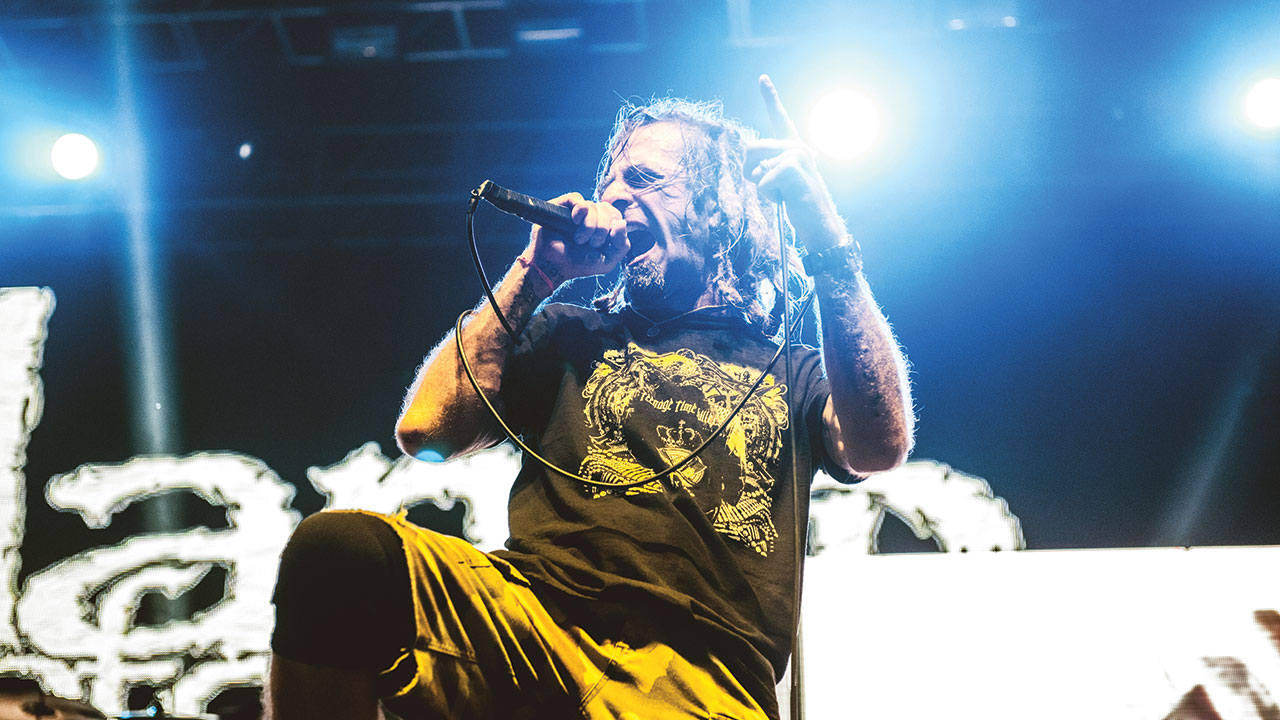
Amon Amarth
The Viking metallers have assembled an army of fans across 10 albums
Are you surprised by your success, given it’s pretty brutal metal?
Johan Hegg (vocals): “A few years ago, we were talking about how far we could go. I remember saying that I couldn’t see any reason why we couldn’t become bigger, but some of the others were saying, ‘No, it’s the growling voice, it’s never gonna be super big!’ But suddenly, we are a lot bigger. Musically we are very accessible, even though I growl. I try to put a tone in there, so it’s more singing than grunting. I wanted to do something different; I think that’s what we all aim for.”
Your Download set was brilliant, with fire and dragons at midday. Do you want to keep building on that side of things?
“Yes. Anyone can stand onstage and play their stuff, but if you want to build a proper show where you play for two hours, there has to be something going on. Growing up, the bands we loved, like Iron Maiden, were the kings of stage set-ups. Ridiculous stuff, but they always pulled it off. They inspire us.”
Do you feel you’ve achieved everything you set out to?
“More! Ha ha! The first thing we wanted to do was put out a record. We’ve put out 10… but we never look too far ahead. First you want a record deal, then you want to tour, then tour the US. We always took it step by step.”
If it all goes wrong, you can always play in Germany for the rest of your lives…
“Ha ha ha! They did love us first. Almost anywhere we go nowadays, we have a great crowd. It’s a lot of fun.
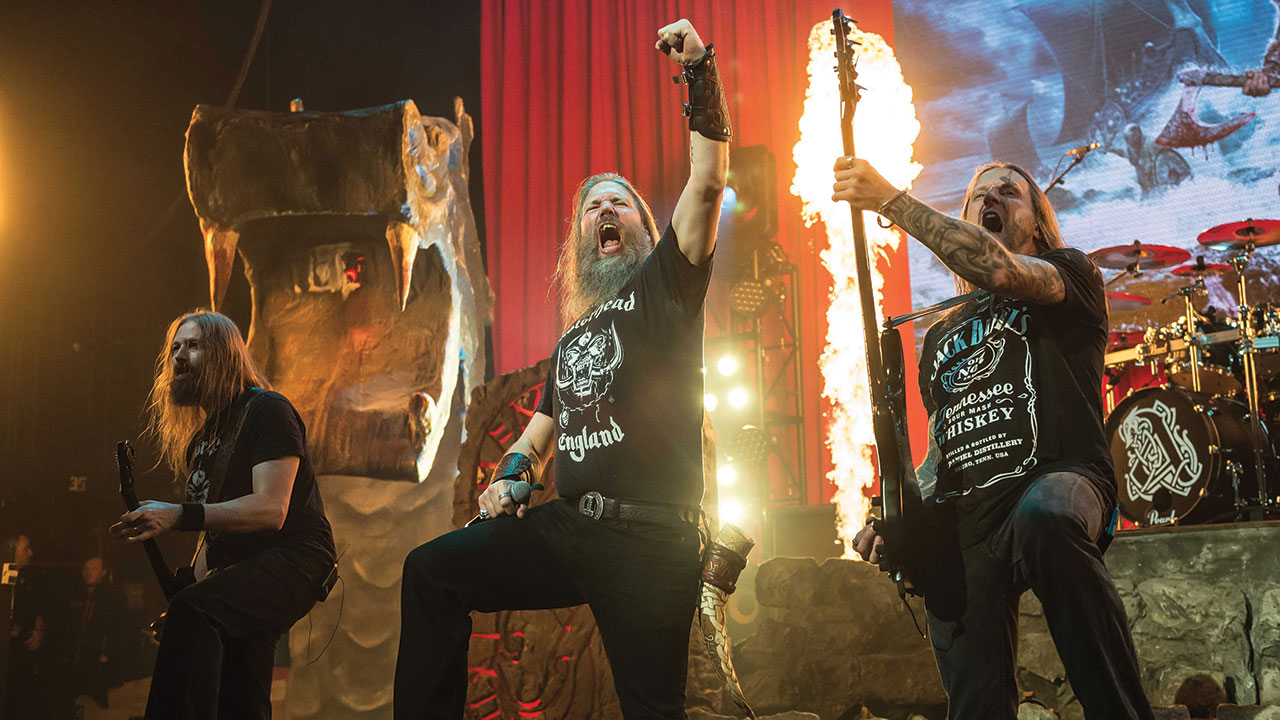
Creeper
From the children of Marilyn Manson comes a meeting place for today’s misfits and freaks
Why have Creeper connected with people, do you think?
Will Gould (Vocals): “I always wonder about that. For years, punk and hardcore – which is where we’re from originally – has become more straight-up. I grew up with more flamboyant stuff. Our idea was to attach Creeper to that kind of stuff. I also think that a lot of kids feel very weird and out of place, and we are very much those sort of people ourselves.”
Does Creeper draw fans of different genres together?
“The idea of Creeper was that we were trying to get that brotherhood feeling again. That’s why we had the back patches made. At our gigs we have metalheads, hardcore kids, goth kids, pop-punk kids – a melting pot of scenes. We don’t fit into any of those brackets properly, but we exist in all of those things. The idea of our patches was that it was something that was universal, kind of like a genderless Lost Boys. The idea reminded me of the glory days when I was a kid – of going to gigs and feeling unified. Now, when you look around at a Creeper show and see the patches on a real range of people, that’s really special.”
Who is your biggest hero from 30 years of Metal Hammer?
“When I was reading Hammer as a kid, my favourite was Marilyn Manson. He was a massive influence for me growing up. Antichrist Superstar, Mechanical Animals, Holy Wood – that trilogy of records. I remember hearing them and thinking, ‘Fucking hell!’ That’s what stimulated me to get into that whole culture. I went to a Catholic primary school, which is really funny now, and my mum was really religious. But when my parents divorced, she completely lost faith. We no longer went to Catholic school, never went to Sunday school. I remember going away with that school wearing a Marilyn Manson ‘Bigger than Satan’ t-shirt, and them having a proper sit-down conversation with me trying to convert me back! He was perfect for me.”
What’s your biggest ambition?
“I always thought that the things we’re doing now were completely unobtainable for a band like us – it didn’t seem like we were cut out for it. It continually surprises me. Winning Best New Band at the Metal Hammer Golden God Awards is a good example – how crazy is that?! I was in complete shock and awe. I’d like for the listener to listen to us and then create something themselves. I was really nervous and anxious as a kid, but music and being creative can do so much for you as a person.”
Megadeth
Fifteen albums in, Dave Mustaine and co are still creating symphonies of destruction
How have you managed to stay true to yourself during the last 30 years?
Dave Mustaine (Vocals, guitar): “A lot of it comes from not really caring about what people say. It can be hard – it’s pretty lonely when you’re either loved or hated. I’m a very polarising personality, and more people like Megadeth than they do me, which I think is funny. If I was caught up in how I looked, or acted, or how I sang, I’d have quit a long time ago.”
Megadeth has been defined by angry commentary on the world. Are there still things to rage about today?
“As far as global stuff with the bureaucrats, Illuminati and the elitists like Big Pharma who are preying on innocent victims, I just think that is so fucked up. There was that guy, a pharmaceutical giant over here in America called Martin Shkreli, the most hated man in the world, he was charging $700 a pill for HIV treatment…. what kind of a fucker does that? If that was me, and I had the cure to AIDS, I’d give it away. Just like Mercedes Benz did with the crumple [zone] frame of the car. Some things are just too important. I really hope he’s [going to be] getting married to somebody named ‘Rock’ in prison somewhere…”
How has the metal scene changed since Megadeth began?
“Ha! Well, when Hammer started, when we started, ‘music business’ was all one word. [Then] there were people who got into our business after they saw how much money was to be made off the very conservative, very loyal heavy metal fan. When you look at how it is now, the ‘music business’ became two words – you have all these people coming in from record companies and radio stations, and when it comes down to picking singles or making records, they couldn’t find their ass with two hands!”
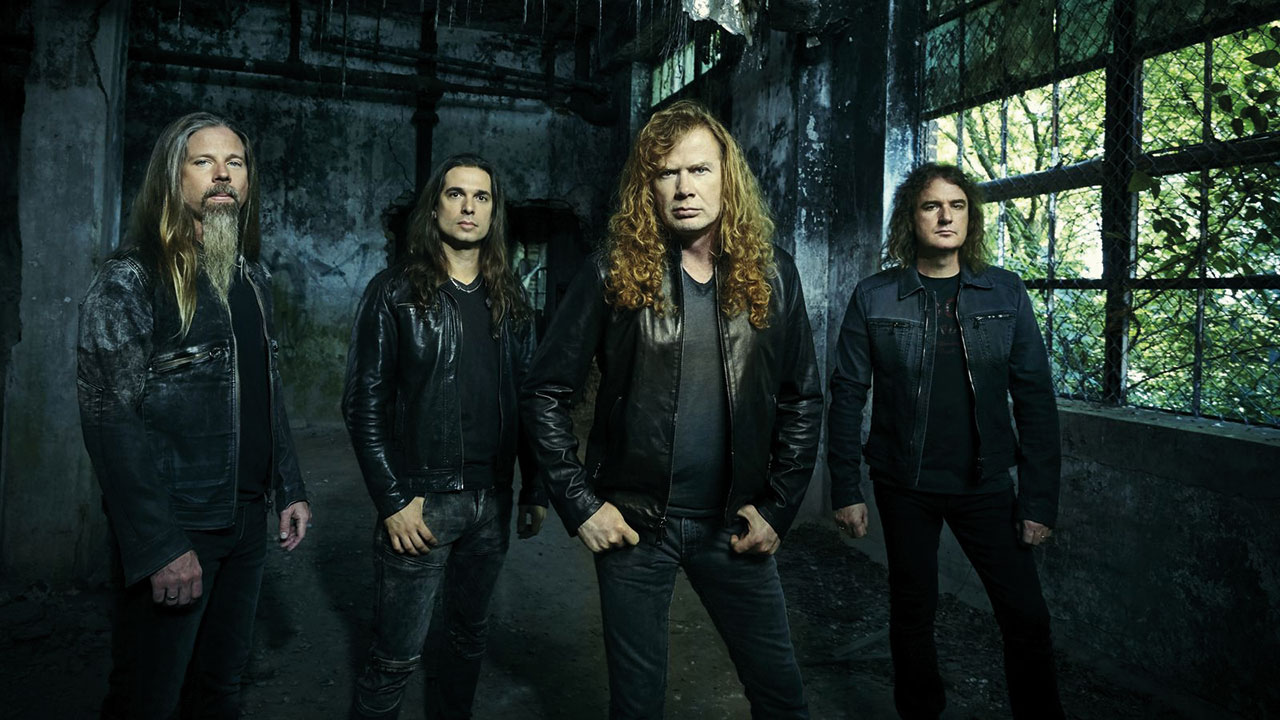
Nightwish
Led by their talented maestro Tuomas, the Finns are a true force of nature
You were originally going to be a marine biologist. What made you turn away from studying that?
Tuomas Holopainen (Keyboards): “That was my childhood dream since I was about six years old, and I even ended up studying marine biology in a university in Finland for about six months until I realised that it was not really my thing. I am still following science on a regular basis, but the academic life was just not my cup of tea. I think the main thing was that the appeal of the band was so much bigger at that time. I didn’t really mind the studying, but Nightwish took over. If we didn’t have the band I think I would have finished my studies and would be studying whales somewhere in the world.”
Did you think about ending the band after the split with your original singer, Tarja?
“No, actually. There was too much healthy pride in the band, not only me but all the other bandmembers saying, ‘We are not going to quit, this is not going to be the end, we’re going to survive somehow.’ But there was a moment back in 2001 when I remember telling the band that I was seriously considering quitting. Because there was just too much going on, we didn’t have a manager, so we were doing everything ourselves, and that burned me out a little bit.”
What is it that drives you to keep leading Nightwish?
“I don’t think I would function as a human being unless I had music. Nightwish is a concept that can fulfil every single musical dream and ambition – even perversion – that you have. We are not bound to any musical category with this band – you can do anything. I have such talented musicians and singers around me. I never have to think, ‘What if they cannot play or sing this?’ so I am extremely privileged. Making music is all about self-discovery for me – that’s why I do music and that’s why I need to do it.”

- Metal Hammer Is Turning 30: Get Excited!
- The 30 Greatest Metal Hammer Front Covers Of The Last 30 Years
- The 30 best moments from the last 30 years of metal
- The 30 Greatest Metal Debut Albums Of The Last 30 Years
Parkway Drive
Winston McCall has long killed off his ‘himbo’ tag to become one of modern rock’s most outspoken activists
How do you feel the perception of Parkway has changed?
Winston McCall (vocals): “It’s definitely become more serious. For a long time we were the ‘board shorts happy band who go crazy on stage’. People would laugh at us, they’d ask us questions about being Australian, that was it. But that’s never been us; we’ve never been shallow in that sense, and luckily, people have become more bothered to read our lyrics and ask us proper questions based on that.”
How’s the political climate back home not compared to 10 years ago?
“It seems like the older style of politics just isn’t cutting it any more. A younger generation is pushing for change – that’s happening in England, in Australia, it’s happening everywhere. It’s pretty nuts.”
Are the younger generation waking up to world issues?
“Yeah. You’re talking about a generation which has more access to information and it’s created all these different viewpoints, and now it’s becoming a generational gap that’s coming to a head.”
What would you say to a young fan wanting to become more proactive?
“Talk to people. Go places. Most of the activity that I was exposed to when I was younger wasn’t from old hippies handing me leaflets – it was going to a gig and talking to someone and going, ‘Shit, this person is dressed like me and they care about things I care about.’ It’s called the ‘metal community’ for a reason.”
Five Finger Death Punch
Zoltan Bathory has come from behind the Iron Curtain to power a true new metal force
What was the metal scene like in Communist Hungary?
Zoltan Bathory (Guitar): “It was completely underground, but incredibly powerful. Heavy metal wasn’t just music for us – in some way it was the voice of rebellion. Even in the West the genre was demonised, so you guys can imagine how the authorities in communist countries received it. Hungary wasn’t completely insane, but my friends in Russia and Romania had to hide that they were metalheads for fear of very serious repercussions.”
What was it like making your first album, The Way Of The Fist?
“We were hell-bent on making the record our way. We didn’t care what the ‘hot sound’ labels were looking for at the time was. We didn’t have a producer, a manager or a label, and our attitude was, ‘We are doing this with or without the help of anyone, and we’ll release it on our own if we have to!’ After half of the record was done, we knew we had something special.”
With all the fights you guys have had, was there ever a point you thought you were done?
“There were some… challenging moments. I believe every conflict, even the most difficult ones, can be solved. You may not know how, but there is a solution. As long as you don’t get caught up in emotions and handle life as if it was a chess game, you’ll figure it out.”
What has been Five Finger Death Punch’s biggest challenge to date?
“To accurately portray who we are! People believe what they read and they don’t necessarily understand that, especially online, anybody can lie without serious repercussions. I mean, blatantly lie – take things out of context and bias public opinion. People will resent you for things you didn’t even do or say! That was a challenge.”
What ambitions do you have left?
“You have to stay relevant. You have to walk the fine line between innovating your sound and a change so drastic that you lose your musical identity and with that your fanbase. We always try to put on bigger, more interesting shows – in fact, we are about to make the next jump regarding them. It’s a great feeling when we’re firing on all cylinders.”
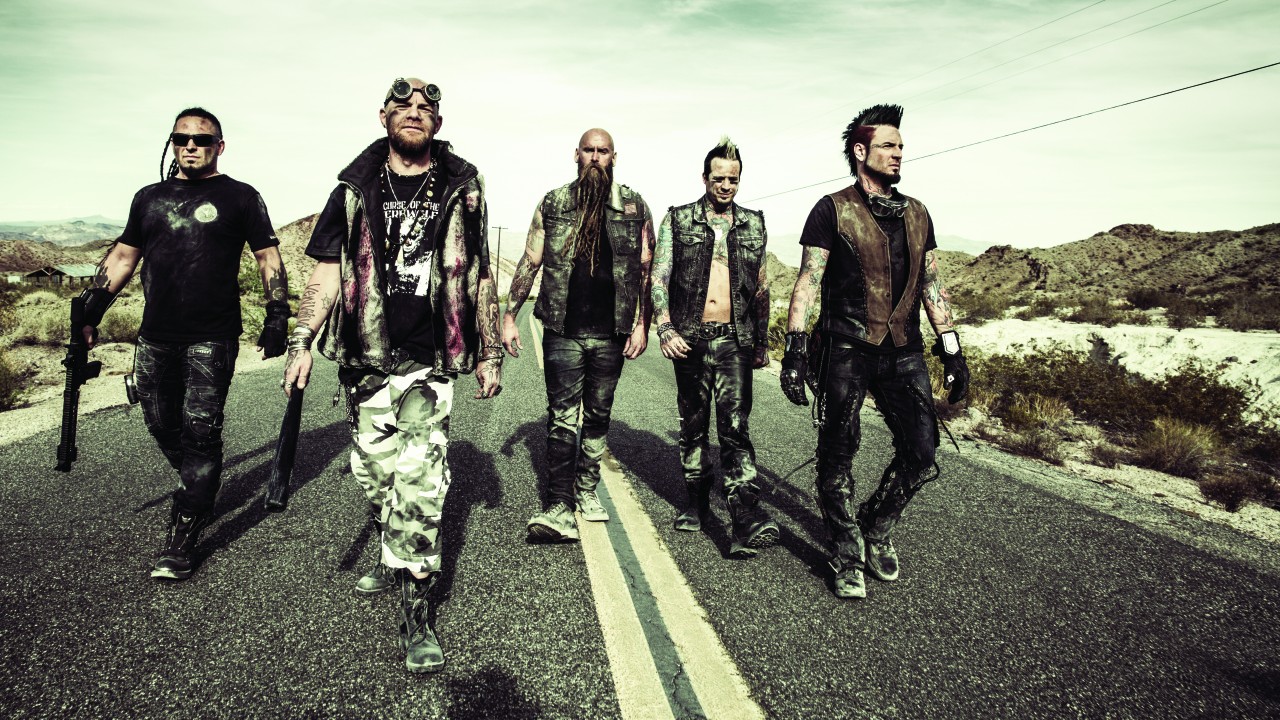
Opeth
From metal masterpieces to prog odysseys, it’s always been about the music for Sweden’s pioneers of heavy
Do you remember your first UK show?
MIKAEL ÅKERFELDT (VOCALS): “I do! We were playing with a local band who had a demo tape out, and there were maybe 50 people there. The next time was on [1998’s] My Arms, Your Hearse, and we played to only one guy… who was on the guestlist.”
What’s the biggest crowd you’ve ever played to?
“One time at Wacken, it was sunset as we were playing, and from the stage it looked like a wide corridor of people and I couldn’t see the end. I’m sure people at the back were buying fajitas or something, but it looked like it went on forever and that everyone was watching.”
Was there ever a time when you felt like giving up?
“Yeah, around the time of [2002’s] Deliverance. After that record, we did a documentary that came with the Lamentations DVD. I had to redo it when I was in a better mood because I was so negative about the future of the band! We had all sorts of problems, I wasn’t happy with anything, and I got sick. My shit turned grey. I tried to pull some shows in the UK because I was ill, but we couldn’t! I remember going to the toilet at the Mean Fiddler and it was brown shit again, right before the show. I went, ‘Yeah!’ [does a fist pump]. Ha ha! But I couldn’t do anything else for a living.”
Do you remember the first time you were in Metal Hammer?
“No. I remember it being a big thing, but I didn’t have the money to buy the issue!”
What’s been the highlight of your career to date?
“Playing at the Royal Albert Hall. It’s an honour to play with bands like Iron Maiden and Black Sabbath, too. It’s good for our egos!”
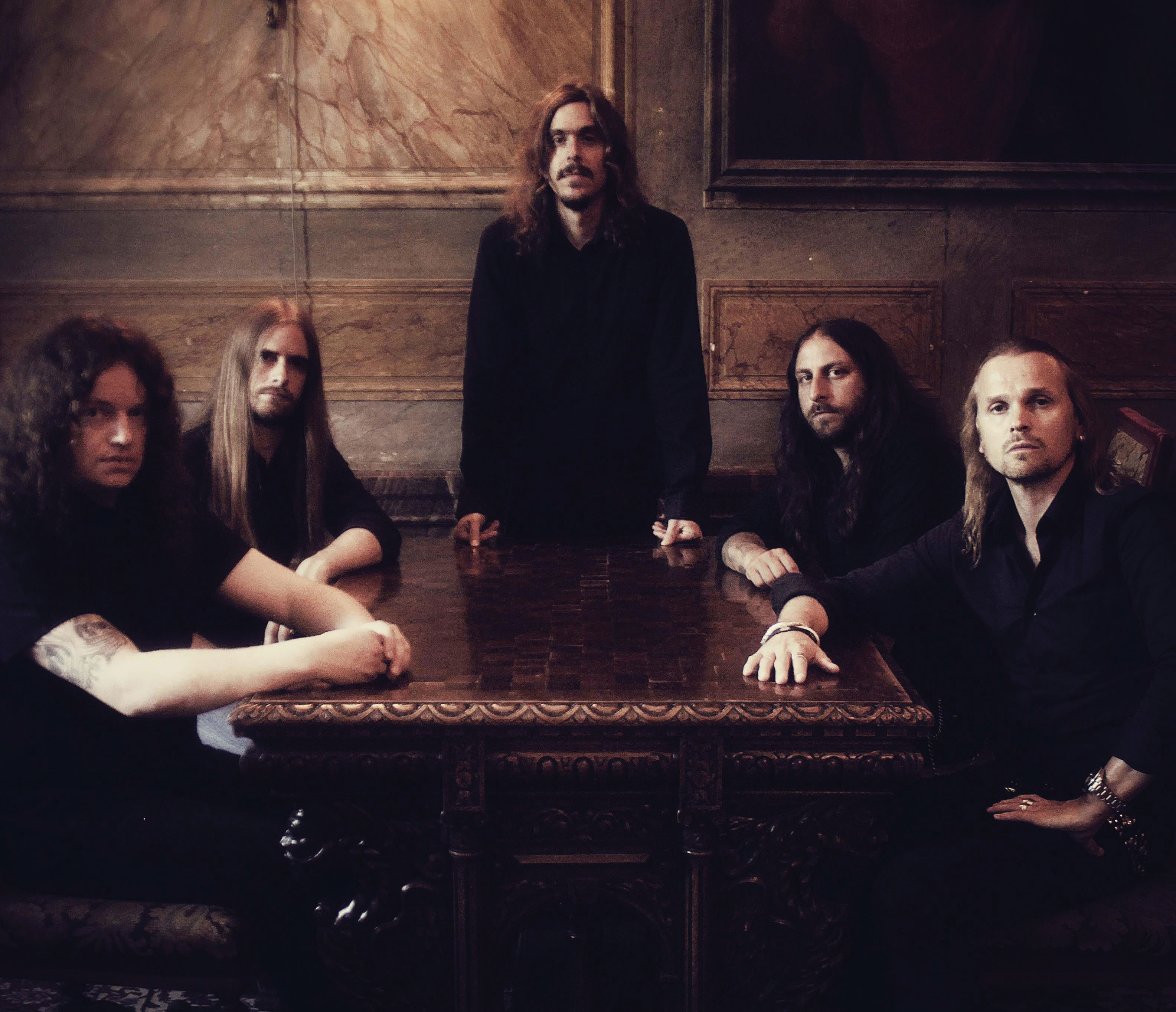
Linkin Park
Nu metal’s innovators attacked the mainstream and carved out their own niche
How did it feel to be on the cover of Metal Hammer for the first time back in the early 00s?
Chester Bennington (vocals): “We were coming up to being one of the biggest bands in the world in a very short period of time. To be on the cover of Metal Hammer was a huge achievement.”
What’s been your career highlight, and your biggest challenge?
“One of the biggest for me was performing at the Grammys with Paul McCartney and Jay Z [in 2006]. It was trippy to see Tina Turner crying. As for challenges, I find every year of my life challenging. Even with all the success, I feel like life has an extra helping of shit that overshadows anything I could be celebrating. I find it hard to let go of expectations.”
Do you feel like the early cynicism about you guys ‘belonging’ in the metal scene has finally died out?
“I think people take us for what we are. We write songs that a lot of people can relate to. But on a really heavy lineup, I would feel like the Backstreet Boys, and there’s probably a lot of people who think the same. But we’re there for a reason – I feel like we’ve earned our place.”
You played Hybrid Theory in full at Download in 2014. Was there a sense of vindication that the set got so well received at the home of metal?
“That feeling of the public and the music community supporting that record was very special, because we got to see how profound its impact was. We played at the Warped Tour the same year, and a bunch of bands came up to me and said that our band was the reason they started playing. That record opened up every door in our life.”
Founded in 1983, Metal Hammer is the global home of all things heavy. We have breaking news, exclusive interviews with the biggest bands and names in metal, rock, hardcore, grunge and beyond, expert reviews of the lastest releases and unrivalled insider access to metal's most exciting new scenes and movements. No matter what you're into – be it heavy metal, punk, hardcore, grunge, alternative, goth, industrial, djent or the stuff so bizarre it defies classification – you'll find it all here, backed by the best writers in our game.
